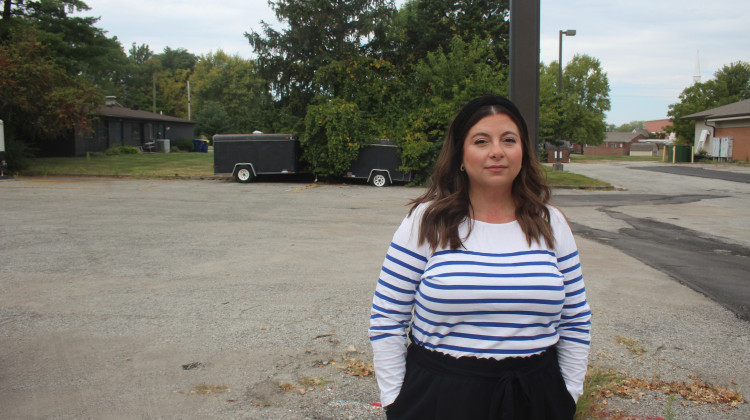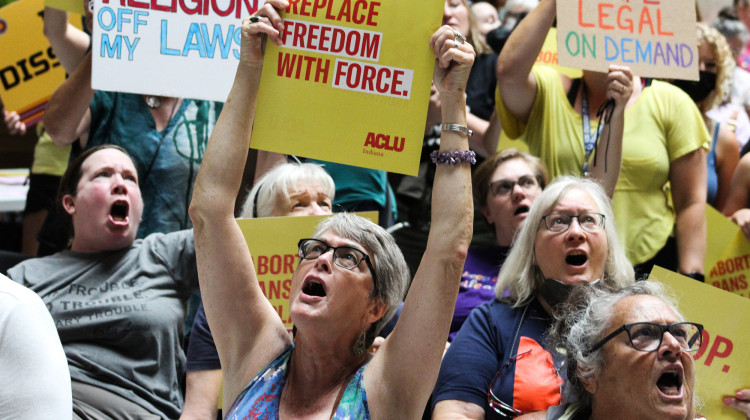
Hannah Croucher and Erin Lang, designers of the Syrian refugee living board game.
Courtesy of the Indiana Interchurch CenterThe war in Syria has created a humanitarian disaster – since its start nearly five years ago, more than half of Syria’s 22 million people have had to flee their homes. An Indianapolis woman has created a game that asks its players to step into the shoes of the most vulnerable refugees – children.
About 15 people have come to play the Syrian Refugee Board Game at the Indiana Interchurch Center. As their numbers are called, they rise from their seats and step to numbered pieces of paper laid out in a large circle around the room. And one by one, they choose cards containing snippets of stories from Syrian children.
“You and your family members are terrified from the break down. Everyone in Syria is terrified. Stay where you are.”
“You had to leave your brother behind to come to Jordan while he was too injured to get out of bed. You miss him terribly and worry about him. You got out of Syrian but you miss your brother so much. The pain is unbearable. Stay where you are.”
“You get in contact with a program doing arts and theatre programs. You get the chance to attend. The program helps you sort through your depression. Move forward one space.”
“Your mother is abused. You see how upset she is. You’re told to stay silent. It’s the safest option. Move backward one space.”
Erin Lang, a senior at IUPUI, drew the vignettes from a Save the Children report called “Untold Atrocities,” which she read while doing an internship in Jordan. The experience had a profound impact on her. So did the execution of an Indianapolis aide worker in Syria by ISIS.
“With the loss of Peter Abdul Rahman Kassig – that right there is an example of how this crisis has directly related to home and hit so close to home," Lang said. "I’m hoping that the general Indianapolis community – anybody from any walk of life – will be able to come and just take a 30 minute, hour long glimpse of what it’s like to be a Syrian refugee.”
Lang is an educator at heart and co-created a K-12 education company called Benga International. A piece of an extensive curriculum for middle and high school students blends traditional social studies with opportunities to cultivate empathy for kids caught in the Syrian crisis. It’s based on the Living Board Game.
“At my home in Syria we dug a hole in the garden to hide in. It was only big enough for 3 people to crouch in -me and my two brothers. But what about my mother? We have nothing to keep us safe. Stay where you are.”
“Some of your friends have become mute because – because of what they have seen. They recognize their children are no longer able to be children anymore. Move back one space.”
John Clark, a visiting professor at IU’s School of Public and Environmental Affairs, says the game helps people make a personal connection to the human costs of war:
“Just the experience of reading out loud and listening to the lives of these children - it makes it vivid and memorable in a way that we can’t capture other ways," Clark said. "Human beings need to have this kind of experience to be able to have a deeper sense of understanding and maybe a sense of empowerment.”
Lang hopes to share the Syrian Refugee Board Game with wider audiences.
 DONATE
DONATE






 Support WFYI. We can't do it without you.
Support WFYI. We can't do it without you.